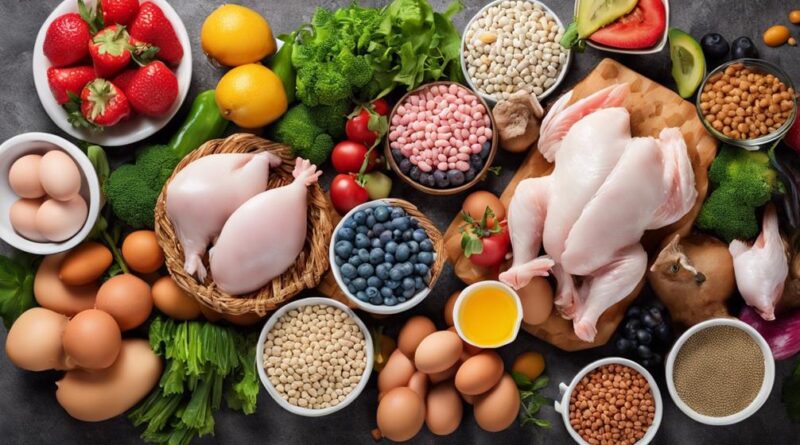Nutrition Tips for Your Breeding Cats: A How-to
When it comes to nurturing your breeding cats, ensuring their diet is as precise as a fine-tuned instrument is paramount.
But how do you navigate the sea of nutrition advice out there to find what truly works best for your feline companions?
Let's explore the intricacies of crafting a diet that supports the health and well-being of your breeding cats, addressing their unique nutritional needs and providing them with the best possible foundation for a thriving, happy life.
Nutritional Requirements for Breeding Cats
To ensure optimal health and reproductive success for breeding cats, it's essential to provide them with a well-balanced diet rich in essential nutrients. Meeting balanced diet requirements is crucial for the overall well-being of your breeding cats. One way to achieve this is by preparing homemade meals that cater to their specific needs.
When preparing homemade meals for your breeding cats, it's important to ensure that the diet is well-balanced. A balanced diet should include a mix of protein, fats, carbohydrates, vitamins, and minerals. Proteins are essential for muscle development and should make up a significant portion of their diet. Good sources of protein include high-quality meats like chicken, turkey, and fish.
Fats are another important component of their diet, providing energy and aiding in the absorption of fat-soluble vitamins. In addition to proteins and fats, carbohydrates are necessary to provide a source of energy for your breeding cats. While cats are obligate carnivores, meaning that they primarily require meat in their diet, carbohydrates in moderate amounts can also be beneficial.
Incorporating a variety of vegetables and fruits can provide essential vitamins and minerals that contribute to their overall health.
Protein-Rich Diet for Breeding Cats
For breeding cats, ensuring a protein-rich diet is crucial for supporting their muscle development and overall reproductive health. Protein is essential for cats as they're obligate carnivores, meaning their bodies require nutrients found most abundantly in animal-based proteins. When selecting food for your breeding cats, opt for high-quality protein sources like chicken, fish, or turkey to promote optimal muscle growth and maintenance.
Weight management is another crucial aspect to consider when providing a protein-rich diet for breeding cats. Protein can help cats feel fuller for longer periods, reducing the likelihood of overeating and supporting a healthy weight. This is particularly important for breeding cats to ensure they maintain an ideal body condition throughout the breeding process.
In addition to muscle development and weight management, a protein-rich diet also plays a significant role in digestive health for breeding cats. High-quality proteins are easier for cats to digest, reducing the risk of gastrointestinal issues and promoting overall gut health. This is especially important during pregnancy and lactation when the mother's digestive system may be under increased stress.
Essential Vitamins and Minerals
Ensuring breeding cats receive adequate essential vitamins and minerals is crucial for supporting their overall health and reproductive success. A balanced diet is key to providing these vital nutrients. Essential vitamins for breeding cats include vitamin A for vision and immune function, vitamin D for calcium absorption, and vitamin E for reproductive health. Minerals such as calcium, phosphorus, and magnesium are also essential for bone health and muscle function.
Dietary balance plays a significant role in ensuring breeding cats receive the necessary vitamins and minerals. A well-rounded diet that includes high-quality commercial cat food or a balanced homemade diet is essential. Be sure to consult with a veterinarian to determine the best diet for your breeding cat's specific needs.
Nutrient absorption is equally important as nutrient intake. Some vitamins and minerals require other nutrients to be properly absorbed by the body. For example, vitamin D needs fat for absorption, while vitamin C enhances iron absorption. Providing a varied diet with different nutrient sources can help improve overall nutrient absorption in breeding cats.
Proper Hydration for Breeding Cats
Maintaining adequate hydration levels is essential for the health and well-being of breeding cats. Water intake plays a crucial role in ensuring that your cats remain healthy and active. Lack of proper hydration can lead to various health issues, affecting their overall reproductive performance and the health of their offspring.
To ensure that your breeding cats stay well-hydrated, always provide access to clean and fresh water. Cats may prefer running water, so consider investing in a cat water fountain to encourage increased water consumption. Monitoring their hydration levels is vital, especially during hot weather or if they're nursing kittens. Dehydration can be dangerous for breeding cats, so make sure they always have access to water throughout the day.
Encouraging water intake can also be done through wet food, which has a higher moisture content compared to dry kibble. This can help boost their overall hydration levels and contribute to their daily water intake. Additionally, placing water bowls in multiple locations around the house can make it more convenient for your breeding cats to stay hydrated.
Omega-3 Fatty Acids Importance
To optimize the health and reproductive success of your breeding cats, incorporating Omega-3 fatty acids into their diet is crucial. Omega-3 benefits your cats in various ways, supporting their overall well-being and fertility. These essential fatty acids aren't produced by the cat's body, making it necessary to provide them through their diet.
Here are some key points to understand the importance of Omega-3 fatty acids for your breeding cats:
- Heart Health: Omega-3 fatty acids help maintain a healthy heart for your cats, reducing the risk of cardiovascular issues.
- Reproductive Health: These fatty acids play a vital role in reproductive health, supporting fertility and ensuring successful breeding outcomes.
- Joint Health: Omega-3s can help reduce inflammation in the joints, promoting better mobility, which is crucial for active breeding cats.
- Brain Function: Supporting cognitive function, Omega-3 fatty acids aid in keeping your cats sharp and alert.
- Dietary Sources: Include sources of Omega-3 fatty acids like fish oil, flaxseed oil, and certain types of fish in your breeding cat's diet to ensure they receive an adequate intake.
Ensuring your breeding cats receive sufficient Omega-3 fatty acids through their diet can have a significant impact on their overall health and reproductive success. Incorporating these essential nutrients will contribute to keeping your cats in prime condition for successful breeding.
Limiting Carbohydrates in Cat Diet
Incorporate a low-carbohydrate diet to support the health and well-being of your breeding cats, ensuring optimal nutrition for their reproductive success. When considering carbohydrate sources in your cat's diet, it's essential to understand feline metabolism. Cats have evolved as obligate carnivores, meaning their bodies are designed to primarily process proteins and fats rather than carbohydrates. High-carb diets can lead to obesity, diabetes, and other health issues in cats, impacting their breeding capabilities.
To limit carbohydrates in your breeding cat's diet, opt for high-protein, low-carb cat foods. Look for products that list meat as the primary ingredient and avoid those with fillers like corn, wheat, or soy, which are common carbohydrate sources. Feline metabolism thrives on animal-based proteins, making diets rich in meats like chicken, turkey, and fish ideal for breeding cats.
Supplements for Breeding Cats

Consider supplementing your breeding cat's diet with essential nutrients to support their reproductive health and overall well-being. Supplements can play a vital role in ensuring your breeding cat receives all the necessary vitamins and minerals for optimal health. Here are some key points to consider when choosing supplements for your feline friend:
- Omega-3 Fatty Acids**: Omega-3 fatty acids offer various health benefits for breeding cats, including supporting heart health, reducing inflammation, and promoting healthy skin and coat.
- Probiotics: Probiotics can aid in maintaining a healthy gut flora, supporting digestion, and strengthening the immune system.
- Calcium: Adequate calcium intake is crucial for breeding cats to support bone health and muscle function, especially during pregnancy and lactation.
- Vitamins: Essential vitamins like Vitamin E, Vitamin D, and Vitamin B complex are important for overall health and to prevent deficiencies.
- Minerals**: Minerals such as zinc, iron, and selenium are essential for maintaining dietary balance and supporting various bodily functions in breeding cats.
Feeding Schedule and Portions
Establish a consistent feeding schedule and portion sizes to ensure your breeding cat receives the proper nutrition for their reproductive needs and overall health. When it comes to feeding frequency, it's recommended to provide your breeding cat with small meals throughout the day rather than free-feeding. This helps regulate their energy levels and prevents overeating. Additionally, portion control is crucial for maintaining a healthy weight in breeding cats. Be mindful of the portion sizes you're offering, taking into account your cat's activity level and individual metabolism.
Weight management plays a vital role in your cat's overall well-being. By monitoring their food intake and adjusting portions as needed, you can help them stay at an optimal weight for breeding. Meal planning is an essential aspect of ensuring your cat gets the right nutrients in the correct amounts. Consult with your veterinarian to develop a balanced meal plan that meets your breeding cat's specific nutritional requirements.
Frequently Asked Questions
Can Breeding Cats Eat the Same Food as Regular Adult Cats?
Yes, breeding cats have different nutritional requirements than regular adult cats. It's essential to provide them with a diet tailored to their specific needs.
While some foods may be suitable for both, breeding cats often require higher protein and calorie content. Consult with your vet to ensure your breeding cats are getting the right balance of nutrients to support their health and the health of their kittens.
How Can I Tell if My Breeding Cat Is Not Getting Enough Nutrients in Their Diet?
If your breeding cat isn't getting enough nutrients, look for indicators like dull coat, lethargy, or weight loss.
To assess dietary balance, monitor their food intake, consult with a vet, and consider specialized diets.
Keep an eye out for signs of nutrient deficiencies to ensure your cat stays healthy and strong.
Regularly checking their overall health and making adjustments to their diet can help address any nutritional gaps.
Are There Any Specific Foods That Breeding Cats Should Avoid?
When it comes to toxic foods for breeding cats, it's essential to avoid items like onions, garlic, chocolate, alcohol, and caffeine. These can be harmful to your cat's health.
To maintain a balanced diet for your breeding cats, steer clear of these items and focus on providing high-quality cat food that meets their specific nutritional needs.
Always consult with your veterinarian for guidance on the best diet for your breeding cats.
Is It Necessary to Provide Additional Nutritional Supplements for Pregnant or Nursing Cats?
When taking care of breeding cats, it's crucial to consider their dietary needs during pregnancy and nursing. Providing additional nutritional supplements may be necessary to support the health of your pregnant or nursing cat.
These supplements can help ensure they receive the essential vitamins and minerals required for their well-being during this critical period. Consult with your veterinarian to determine the best supplementation plan for your breeding cat's specific needs.
How Can I Ensure That My Breeding Cats Are Maintaining a Healthy Weight During Pregnancy and Lactation?
To ensure your breeding cats maintain a healthy weight during pregnancy and lactation, focus on their body condition and weight management.
Monitor their nutrient absorption closely and adjust their dietary needs as required.
Provide a balanced diet that meets their increased energy demands, ensuring they receive essential nutrients for both themselves and their offspring.
Regularly assess their weight and body condition to make necessary adjustments for their overall health and well-being.
Conclusion
In conclusion, providing your breeding cats with a balanced, protein-rich diet, essential vitamins and minerals, proper hydration, omega-3 fatty acids, and limited carbohydrates is key to their health and wellbeing.
Don't forget to consider supplements and establish a feeding schedule with appropriate portions to meet their specific nutritional needs.
By following these tips, you can ensure that your breeding cats stay healthy and strong throughout the breeding process.
